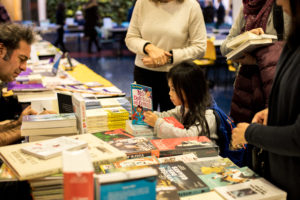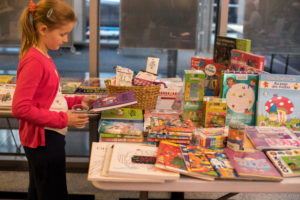On Saturday, December 8, the Cultural Center of Lycée Français de New York invited our community, as well as educators and parents from across the city, for a daylong discussion on the future of reading, “La Lecture, Oui, but Why?“. The first panel included a lively discussion about inspiring children to read, with author Hilary Reyl and literacy expert Christa Japel, professor at the University of Quebec in Montreal.
Their conversation got me thinking about how schools and parents can work together to foster a love of reading in children. Reading is, after all, the skill that transcends all learning. Learning to read is a rite of passage for those privileged enough to receive a formal education. For those lucky enough to learn to read, imagining not being able to read is a little bit like imagining life without electricity; it’s possible but difficult.
 It’s never too early
It’s never too early
Fostering a love of learning begins at home, and it is never too early to start.
Reading specialists, such as Australian author Mem Fox, assert that reading aloud to children builds the very basic and necessary groundwork for them to have easy access to decoding and to understanding words. She offers a list of “Ten Read Aloud Commandments,” which I invite everyone to read.
Indeed, exposure to depth and breadth of words in general is essential for developing minds. Parents, grandparents or guardians have a responsibility in this process long before their children start school. Children need to hear vocabulary used in context in order to widen their world vision, and that begins with speaking to babies in full sentences. Explaining their surroundings to them, for example. It should continue with reading books to them every day.
“Children need to hear a thousand stories before they can begin to learn to read,” proclaims Mem Fox.
With our busy lives, do we take the time for this essential part of learning with our children daily?
 A calm place and a book of their choice
A calm place and a book of their choice
As children grow older, context is ever important. We must not allow children to associate reading with unpleasant feelings (rushed, fed up, or other negative vibes). A cozy and calm place where you share a special moment with your child while reading to them a story of their choice, even if repeated multiple times, will help them to learn to love reading.
Try to expose them to stories they will like, with characters they can relate to, but that give them multiple perspectives to help them develop empathy for others. Ask them questions about the story as you are reading together, or get them to predict what might happen next…. Once finished, go back and have them spot key words. You might have them invent a new and different and creative ending to a beloved story. Offer a choice of books, and as much as possible, try to give children printed books. Exposure to screens will happen naturally in our modern age!
 Engaging teens
Engaging teens
According to Maryanne Wolf, Director of the Center for Dyslexia, Diverse Learners, and Social Justice from UCLA, young adults often only skim text when they read on electronic devices, which she says, “reduces the time allocated to deep reading processes.” Less time reflecting on substance can prevent young readers from grasping the complexity of what they read, but there is a solution.
It may sound silly for a teenager, but adults can absolutely model reading for our children by reading together with them well into their teen years. Discuss articles or books you are reading that may be of interest to them as conversation starters. Family traditions and values are often passed on in these special moments, and teenagers will appreciate being asked questions about their perspective and being listened to. In that direction, ask your teens what type of literary genres they enjoy and check out books from your local library so they are readily available at home! Do not force reading on your child. Sometimes, a magazine article on a topic they are passionate about can be enough to hook them and get a lively conversation started at home…
So what are you waiting for?
About the Author :
In August 2018, Audrey Peverelli joined the Lycée Français de New York as the eighth head of school in the institution’s 80+ year history. She is a quadrilingual international educator par excellence, with a 30-year career as teacher, director and founder of bilingual schools around the world, including in France, Switzerland, Venezuela and Brazil.


